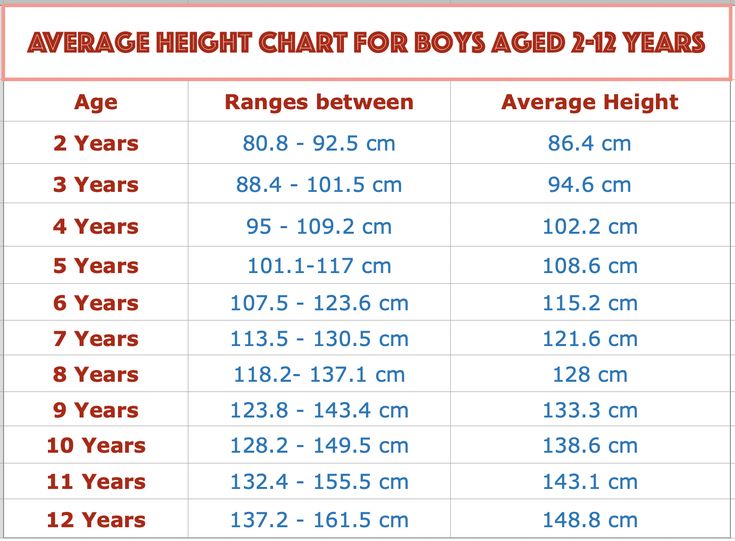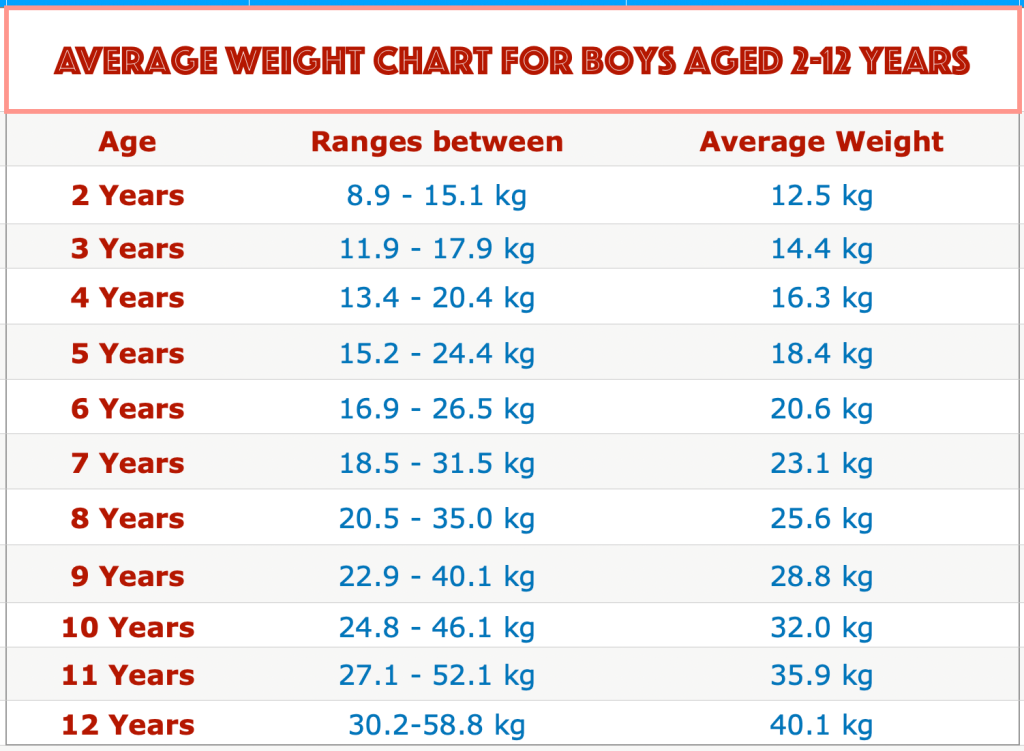When Do Boys Stop Growing? The Stages of Boys’ Height Development

When boys reach adolescence, they often appear to gain a significant amount of height in a short period of time, leaving parents to wonder, when do boys stop growing?
The truth might surprise you! Many factors at play affect how tall a boy will be when he reaches adulthood. So, keep reading to learn everything you need to know about when boys stop growing.
Contents:
- Fast Facts on When Boys Stop Growing
- When Do Boys Typically Fully Mature?
- What’s the Average Boy’s Height?
- Factors That Influence Height for Boys
- What are the Main Signs of Puberty in a Boy?
- When Do Boys Have Growth Spurts?
- When Do Boys Stop Growing in Height?
- Height Prediction Methods for Boys
- When to See a Doctor
- FAQs
Fast Facts on When Boys Stop Growing

pics five/Shutterstock.com
Before you dive into the nitty-gritty details, here are some fast facts on when boys stop growing:
- At what age do boys stop growing? The average boy reaches his full height by age 16 years old (although some continue to grow, albeit more slowly, until 21).
- Puberty is the most significant factor when a male starts to grow. Expect significant growth spurts beginning at ages 12–15.
- Several factors impact height, the largest of which is genetics. However, several health conditions can prevent a boy from gaining height or too much height.
- Boys generally grow faster than girls in childhood and tend to stop growing later. Girls reach their full height at 14 or 15, while boys typically stop growing at 16.
- If a boy stops growing before 16, take them to a pediatrician who may refer them to a pediatric endocrinologist or pediatric geneticist.
For the purposes of this article, the term ‘boy’ refers to the sex assigned at birth. Gender and sex exist on a spectrum so it’s normal for gender identity not to align with this term.
When Do Boys Typically Fully Mature?
Most boys grow little in height between the ages of 18 and 20. According to Healthline, on average, even if they hit puberty late, boys will see their most significant growth spurt from the ages of 12 to 15.
While boys typically reach their full height by 16, they still face other growth milestones.
Boys typically mature at 21 years of age, although according to a report published by the National Library of Medicine titled “Maturation of the adolescent brain,” a boy’s brain doesn’t fully develop until 25, and peak muscle mass fully develops between the ages of 20 and 30.
What’s the Average Boy’s Height?


Source: shishuworld.com
Here’s a brief summary of the average levels of growth you should expect according to a boy’s age:
| Age (years) | Height Range (cm) | Average Height (cm) |
| 2 | 83-90 | 86.4 |
| 3 | 91-98 | 94.6 |
| 4 | 99-106 | 102.2 |
| 5 | 105-112 | 108.6 |
| 6 | 111-118 | 115.2 |
| 7 | 117-125 | 121.6 |
| 8 | 123-132 | 128.0 |
| 9 | 127-138 | 33.3 |
| 10 | 130-143 | 138.6 |
| 11 | 133-148 | 143.1 |
| 12 | 136-153 | 148.8 |
| 13 | 140-160 | 156.7 |
| 14 | 145-168 | 163.2 |
| 15 | 150-175 | 169.0 |
| 16 | 157-180 | 173.4 |
| 17 | 162-183 | 175.2 |
| 18 | 165-185 | 176.8 |
⠀
In other words, in the early stages of life, boys typically grow at quite a rapid rate, gaining around 8 cm of height per year and 2 kg of weight. As they get older, the increases in height drop to around 5 cm per year, while weight increases can go up to around 4–5 kg per year as they approach adolescence.
The average boy’s height is tricky to pin down as some boys reach their full height at 17 while others still gain inches until they turn 21.
according to the Stature-for-age and Weight-for-age percentiles (2 to 20 years: Boys) chart provided by the Centers for Disease Control and Prevention (CDC), parents can expect that half of boys will be shorter, and half will be taller than the 50th percentile, or median height at every age.
On average, a boy will grow 3 inches yearly during puberty, typically between ages 9 and 14.
Healthy and Concerning Weight Ranges for Boys by Age
Here’s a comparison table of weight ranges for boys by age, using general guidelines provided by the CDC and WHO growth charts.
| Age (Years) | Normal Weight Range (Boys) | Underweight (Below) | Overweight (Above) |
| 2 | 24–30 lbs (10.9–13.6 kg) | <24 lbs (<10.9 kg) | >30 lbs (>13.6 kg) |
| 4 | 30–40 lbs (13.6–18.1 kg) | <30 lbs (<13.6 kg) | >40 lbs (>18.1 kg) |
| 6 | 36–60 lbs (16.3–27.2 kg) | <36 lbs (<16.3 kg) | >60 lbs (>27.2 kg) |
| 8 | 44–75 lbs (20.0–34.0 kg) | <44 lbs (<20.0 kg) | >75 lbs (>34.0 kg) |
| 10 | 54–95 lbs (24.5–43.1 kg) | <54 lbs (<24.5 kg) | >95 lbs (>43.1 kg) |
| 12 | 68–125 lbs (30.8–56.7 kg) | <68 lbs (<30.8 kg) | >125 lbs (>56.7 kg) |
| 14 | 85–145 lbs (38.6–65.8 kg) | <85 lbs (<38.6 kg) | >145 lbs (>65.8 kg) |
| 16 | 105–165 lbs (47.6–74.8 kg) | <105 lbs (<47.6 kg) | >165 lbs (>74.8 kg) |
| 18 | 125–185 lbs (56.7–83.9 kg) | <125 lbs (<56.7 kg) | >185 lbs (>83.9 kg) |
Notes:
- Variability: These ranges are approximations and can vary due to genetics, activity levels, and growth patterns. Always refer to a healthcare provider for accurate assessments.
- BMI Percentile: The CDC uses BMI percentiles to classify underweight (<5th percentile), overweight (>85th percentile), and obesity (>95th percentile) in children and teens.
- Concerns:
- Underweight could indicate nutritional deficiencies, chronic illness, or growth delays.
- Overweight could signal risk factors for future health issues, like type 2 diabetes or heart problems.
Factors That Influence Height for Boys

karelnoppe/Shutterstock.com
Many different factors influence a boy’s height. Like every other physical trait, one boy might grow very quickly but stop at age 17, while another grows slowly, only to gain more height by age 21.
Still, boys can expect a variety of factors to influence their height. Some of these factors fall outside a boy’s control, while parents can help prevent others. According to healthychildren.org (from the American Academy of Pediatrics (AAP)), these factors include:
- Nutrition: The foods a boy eats can determine their eventual height. For example, an overweight child is often taller compared to the rest of his classmates, while underweight children might be shorter. However, it’s crucial to note that these markers don’t define a boy’s adult height.
- Genetics: If a boy’s parents are taller than average, it’s likely that he will also reach a similar height. The same applies to a boy whose parents are shorter than average. Genetics tend to define a boy’s size, although this isn’t always the case, and other factors can also influence how tall a boy grows.
- Growth Hormone Deficiency: This medical condition occurs when the pituitary gland doesn’t produce enough growth hormone.
- Other Health Conditions: Chronic health conditions like celiac disease, cancer, and arthritis can impact a boy’s growth. In many cases, the medications prescribed to treat the health condition can impact height.
- Genetic Disorders: Specific genetic disorders may cause a boy to be shorter or taller compared to his peers. While genetic disorders differ from person to person, certain traits like height typically remain the same. For example, Marfan Syndrome causes children to grow tall, while Down Syndrome or Turner Syndrome tends to cause children to be shorter.
- Environmental Factors: Certain environmental factors, such as poor nutrition, poor healthcare, physical activity, and socioeconomic status, like income, education, and occupation, can affect growth patterns in children.
If you’re at all concerned about your boy’s growth, it’s crucial to seek the advice of a healthcare professional like a pediatrician. This is especially important if you suspect your child exhibits signs or symptoms of a genetic disorder, health condition, or hormone deficiency.
Are you a concerned parent trying to keep track of your child’s safety and whereabouts? Look no further! Download the Findmykids app today and gain peace of mind while your child explores the world.
The Role of Sleep and Nutrition in Boys’ Growth
During puberty, boys should get at least eight to ten hours of sleep to ensure proper development. Sleep is essential for the release of growth hormone, which drives both height and muscle growth during adolescence. Sleep deprivation can delay these processes, leading to slower growth and developmental issues.
In addition to sleep, a balanced diet is crucial for supporting the rapid physical changes boys experience during puberty. Key nutrients include:
- Protein: Found in eggs, lean meats, beans, and dairy, protein aids muscle development and tissue repair.
- Calcium and Vitamin D: Necessary for strong bones, these can be sourced from dairy products, leafy greens, and fortified cereals.
- Healthy Fats: Essential for hormone production, healthy fats are found in nuts, seeds, and fish like salmon.
- Iron: Needed for energy and blood health, iron is abundant in red meat, poultry, and spinach.
Encouraging regular exercise alongside good sleep and nutrition further ensures optimal growth, as physical activity stimulates bone and muscle development. Creating a consistent routine that prioritizes these lifestyle factors can help boys reach their full growth potential during these critical years.
What are the Main Signs of Puberty in a Boy?

Olezzo/Shutterstock.com
According to the National Institute of Child Health and Human Development (NIH), the signs of puberty in boys include:
- Acne
- Deepening or changes of the voice
- Growth spurt (typically 2 to 2.5 inches per year)
- Growth of facial hair, body hair, and pubic hair
- Enlargement of penis and testicles
A boy should start puberty any time between the ages of 9–14. If a boy starts puberty before 9, this is considered early puberty. When a boy reaches the age of 15 without going through any changes, this is known as delayed puberty. In either case, it’s a good idea to seek advice from a pediatrician or other medical professional.
When Do Boys Have Growth Spurts?

Africa Studio/Shutterstock.com
Growth spurts are a normal part of a boy’s growth and define a period of time of rapid growth. For some boys, growth spurts are painful as they can grow anywhere from 2 to 4 inches in a year!
Signs of a growth spurt include:
- Increase of fat stored in the child’s body
- Significant increase in appetite
- Increases muscle and bone growth
- Body odor due to increased sweat
Boys will generally experience a growth spurt three times at three different stages:
- Infant: During the first two years, a baby can grow 10 inches and triple their weight by year 1.
- Childhood: A boy will at least double their height from infancy, however, this phase of growth is slower and steadier.
- Teenagehood: Growth spurts are the most significant for boys from ages 9 to 14, and most teenagers will experience growth during puberty between the ages of 12 and 17.
During a growth spurt, it’s also common for boys to gain weight. To ensure they are on a healthy growth curve path, parents will want to make sure their son’s body mass index (BMI) is on track as well. The Center of Disease Control and Prevention created a BMI calculator specifically for teens going through puberty so you can ensure their growth is on track for good health!
When Do Boys Stop Growing in Height?
It’s challenging to provide an exact age for when boys stop growing in height. As mentioned above, several factors affect the height of a boy and when they will stop growing, a big part of which is due to genetics.
according to Medical News Today, most boys stop growing in height by age 16, and the average height for a man born in the United States is 70.8 inches or 5 feet 9 inches.
However, according to ehowhealth the male body stops growing when the epiphyseal bone plates mature and seal, which occurs from ages 18–20. For more information, check out the video below!
Height Prediction Methods for Boys
While it would be fantastic if all people could accurately predict their boy’s adult height, it’s just not possible. Why? Well, too many factors are at play to generate a 100% accurate number.
However, according to the Mayo Clinic, it’s possible to generate an estimate based on a few equations.
Method 1:
- Add both parents’ heights (in either centimeters or inches)
- Add 13 centimeters or 5 inches
- Divide by 2
Method 2:
- Double the height of the boy at age 2
Remember, the biggest predictor of height is genetics, which is something that is challenging to measure. Even then, it’s possible to have shorter parents and a very tall boy, or tall parents and a shorter boy.
When to See a Doctor

New Africa/Shutterstock.com
While some boys develop a little later than others, there does come a point when parents should start asking questions.
If a boy is more petite compared to other children their age, they may have a growth problem. According to Healthline, when a boy is smaller than 95% of their classmates, this is a big sign of a medical issue.
There are several signs related to growth in boys that should signal a visit to a pediatrician or other healthcare professional. For example, a boy who’s reached puberty should see a specialist if their rate of growth starts to slow.
| Age | Proper Growth | Delayed Growth |
| 2–4 years | — Growth rate of about 2.5–3.5 inches/year ⠀ — Milestones like running, climbing, and jumping |
— Growth below 2 inches/year ⠀ — Delayed gross motor skills, such as difficulty with running or jumping |
| 5—8 years | — Steady growth of 2 inches/year ⠀ — Gradual increase in muscle mass and coordination |
— Growth rate below 1.5 inches/year ⠀ — Noticeable lag in physical skills compared to peers |
| 9–11 years | — Onset of puberty ⠀ — Growth spurts (2–4 inches/year) ⠀ — Improved coordination and motor skills |
— Delayed onset of puberty
— Difficulty with coordination and clumsiness |
| 12–14 years | — Continued physical growth (3–4 inches/year) ⠀ — Voice changes ⠀ — Development of facial and body hair |
— Lack of secondary sexual characteristics (no voice change, minimal hair growth) |
| 15–17 years | — Physical growth nearing completion ⠀ — Sexual maturation |
— Short stature compared to peers ⠀ — Immature thinking patterns ⠀ — Struggle to form relationships |
| 18–20 years | — Physical maturity reached | — Persistent underdevelopment of physical features (underdeveloped musculature, no facial hair) ⠀ — Immature decision-making |
Comparing Normal Growth with Lagging Growth
Lagging growth is the technical term when an individual—in this case, a boy—does not develop at the usual rate and hit his developmental milestones.
Often, when boys are growing normally, it is relatively easy for parents to see consistent and continual growth. They can see their child getting taller and larger, month by month, year by year. In boys with lagging growth, this entire process is slower and, therefore, much less visible.
Boys with lagging growth may seem to remain the same height and size, or very close to it, for extended periods. Months may pass without them showing noticeable physical changes, and parents can often look at photographs from previous years and birthdays as comparative tools.
This is an important technique—parents should keep close eyes on their children and mark their progress from one year to the next to see whether their child is developing normally or if their growth might be lagging compared to the norm.
Signs of Delayed Growth in Boys
Delayed Puberty or IGD
If a boy doesn’t start puberty by age 14, it’s considered delayed puberty. For most boys, this is known as constitutional delayed puberty, which is inherited from one of the parents. Сonstitutional delayed puberty means that a boy is generally healthy and will hit puberty eventually.
If a boy is diagnosed with a chronic illness like sickle cell disease or inflammatory bowel disease, it may also cause the boy to reach puberty later than his peers.
However, a small percentage of boys will experience isolated gonadotropin deficiency (IGD). IGD causes a deficiency in the crucial puberty hormones called LH and FSH.
Boys are born with this condition, and in many cases, it’s identifiable because the child has a smaller-than-average penis. If a boy doesn’t start puberty by 17, it’s a big sign he has IGD.
Dwarfism
Dwarfism is most often diagnosed at birth or in infancy, as a boy will not reach the same growth milestones as other children his age. A good indication of dwarfism is when the size of a child’s legs or arms is out of proportion to their torso.
Low Levels of Thyroxine or Growth Hormone (GH)
Boys with low levels of thyroxine, which controls the metabolic rate will exhibit signs of exhaustion, dry skin, dry hair, and constipation, and will have difficulty staying warm.
Boys that lack GH will look unusually young, as it can affect the growth of facial features.
Stomach or Bowel Disease
Stomach or bowel disease can impact linear growth and lead to growth failure in some boys. Delayed growth caused by stomach or bowel disease will appear in boys as nausea, constipation, vomiting, or as blood in the stool.
Family History
Genetics can absolutely impact a child’s growth. If a boy has a family history of slower growth or delayed puberty, they shouldn’t worry too much about their development. However, checking in with a family doctor to rule out more serious issues is always a good idea.
If at all concerned about a child’s growth, parents should take him to see a medical professional who can provide a proper and accurate diagnosis.
Insights from Parents Raising Boys

Solid photos/Shutterstock.com
Sarah’s Concern: Growth Plateau at 12 Years Old
Sarah noticed that her 12-year-old son, Ethan, had stopped growing for almost a year while his peers continued to shoot up. Ethan also seemed more tired and withdrawn.
Concerned, Sarah consulted their pediatrician, who conducted a growth chart review and recommended blood tests to check for hormonal imbalances. It turned out Ethan had a mild deficiency in growth hormone. After starting treatment and improving his diet, Ethan resumed normal growth.
Amanda’s Early Bloomer
Amanda’s son, Jake, was always the tallest in his class, but by 13, his growth suddenly slowed, and he started looking more like an adult compared to his friends. Amanda realized this was likely early puberty, a condition known as “precocious puberty,” where growth plates fuse earlier than normal. A visit to the endocrinologist confirmed her suspicions. Although his growth potential was slightly reduced, focusing on a balanced diet and maintaining physical activity helped Jake optimize his final height.
Eric’s Late Growth Spurt
Eric’s parents worried when their 14-year-old son was much shorter than his classmates. Their family doctor reassured them that Eric might just be a late bloomer since both parents had experienced delayed growth during their teens. True to the prediction, Eric experienced a significant growth spurt at 16. Regular checkups and encouragement helped the family stay calm during the waiting period.
Giving Boys the Best Chance to Grow
While many factors affect a boy’s adult height, they can ensure the best possible growth by eating a balanced diet, exercising, and getting adequate sleep.
If a boy starts experiencing growth pains or suddenly seems to sprout up overnight, it’s clear that he’s reached puberty and will continue to grow until he’s at least 16. Parents, when in doubt, should always consult a medical professional to ensure the healthy growth of their child.
FAQs

VH-studio/Shutterstock.com
Do you still have questions about growth in boys? Good! We’ve put together a short list of answers to the most commonly asked questions.
Do boys ever grow after 18?
Some boys grow after 18, just not as rapidly, and they gain fewer inches within a year
But when do men stop growing? By 21, a man will reach his full height.
Do boys grow after 16?
The majority of boys gain their height by age 16. However, it’s not uncommon for boys to continue to grow after 16; they just don’t typically gain multiple inches in a year as they do between the ages of 12 and 16.
Do boys continue growing after age 17?
Most boys stop growing at 16. However, a boy can continue growing after 17. Most likely, he will not experience the kinds of growth spurts most adolescent boys go through after 17, but he can gain a bit more height until he’s 20 or 21.
Do boys stop growing at 16 or 18?
While some boys reach their full height at 16, it’s possible to keep growing at 18. 18 years of age is typically when most boys stop growing. Of course, many variables impact when a boy stops growing, including genetics, nutrition, medical history, and puberty.
Is it true that guys grow until they’re 21?
While most growth charts show males growing until they are 18 years old, in some cases, boys can continue to slowly gain inches in their height until the age of 21.
Do guys grow until they’re 25?
So when do guys stop growing? Guys will stop growing around 21 years of age. However, their brains will be fully developed at the age of 25. Between the ages of 20 and 30 is when a man will gain most of his muscle mass.
What are the 5 signs that you have stopped growing in height?
There are five tell-tale signs that you have reached your full adult height. These include:
- Growth has slowed over the last two years.
- Underarm and pubic hair have grown in completely.
- Shoe size has not changed.
- The genitals have fully grown and developed.
Stature looks more adult-like and less child-like.
The picture on the front page: Littlekidmoment/Shutterstock.com
Проверьте электронный ящик



















